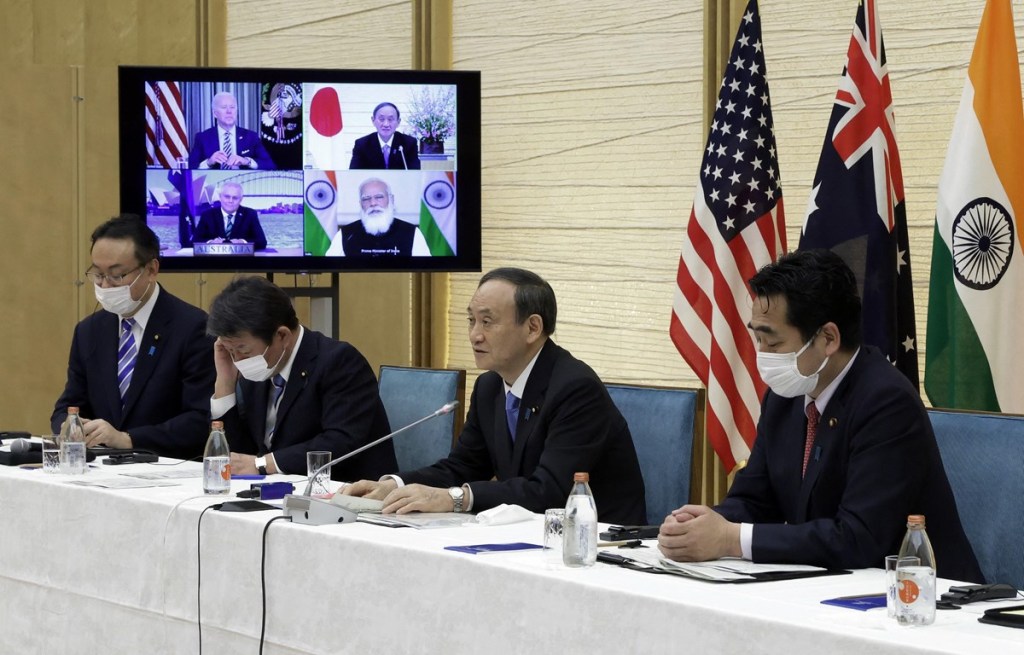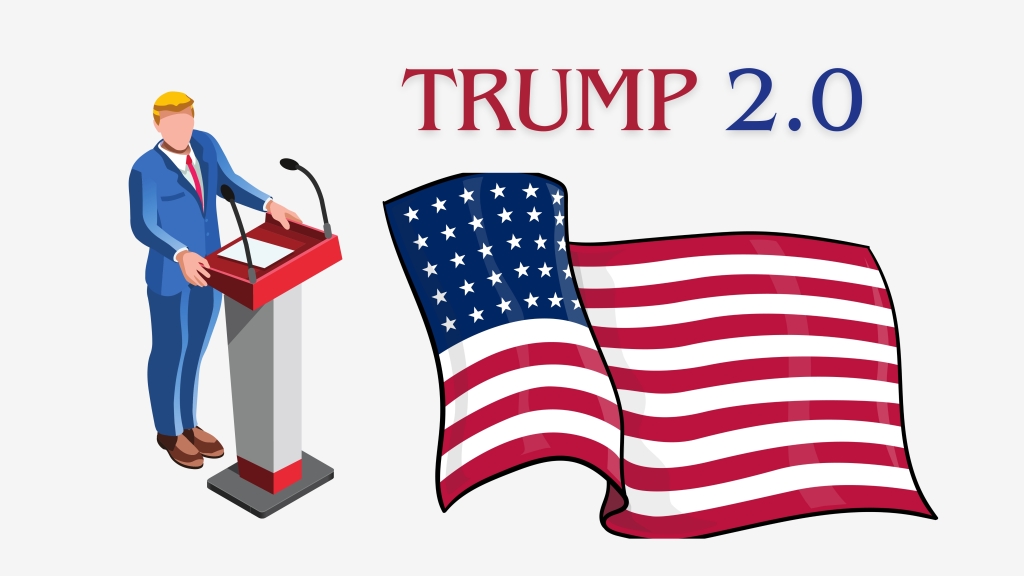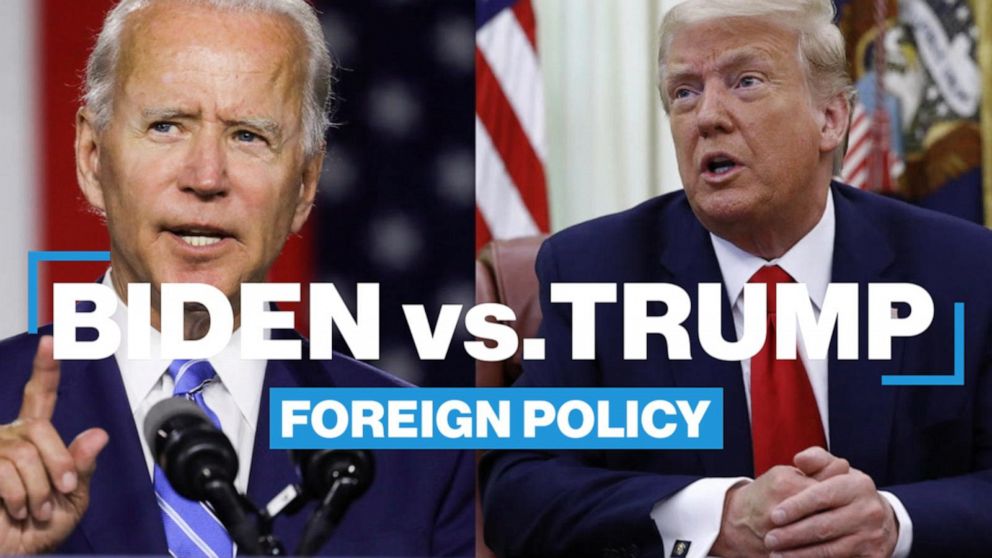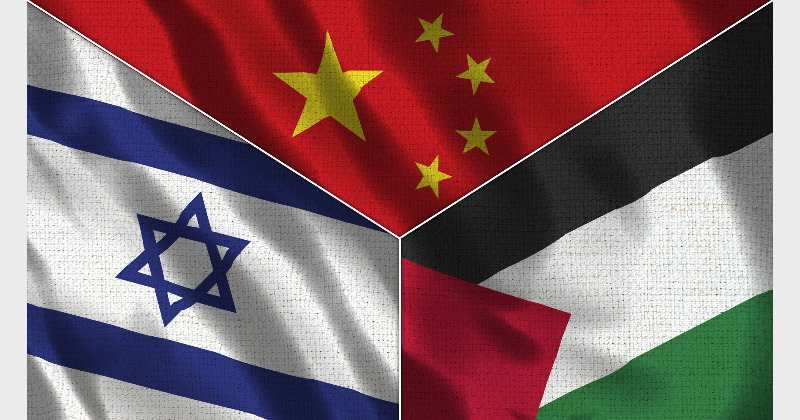Listen to the article
Watching television coverage of the “Quad” (Australia, India, Japan and the United States) leaders virtual meeting from the Chinese media last week, you would have been exposed to a host of expressions frequently used by television readers and commentators. For example, “Cold War mentality,” “anti-Chinese alliance,” “clique of countries aimed at China” are common phrases.
They typically describe states like Japan and Australia as having no strategic autonomy vis-a-vis the United States and that somehow, they are strong-armed into taking an anti-China stance. Depictions of India are even more condescending, despite India’s strong working relationships with many states and its soft power.
The fact that some Western media sources also used the terminology of an anti-Chinese alliance to describe the Quad is also problematic.
It re-enforces a Chinese narrative propagated by the Communist Party that the West is out to get China and prevent its peaceful development.
These are ideas that strongly elicit memories of the “century of humiliation,” an ethno-nationalist lodestone that most ordinary Chinese can relate to, for real and cultivated reasons.
The West and the world have benefited from China’s re-emergence and economic growth. Most would like to, if not have to, continue their trading relationship with China to enjoy sustainable and healthy economic growth in
the years ahead.
Notwithstanding, there are serious concerns about China’s behavior under Xi Jinping and this has brought with it like-minded states such as Japan, the U.S. and others to build new institutions such as the Quad to the Free and Open Indo-Pacific Vision (FOIP) to inculcate peace, stability and a rules-based order in the region.
Without a doubt, the flurry of U.S. diplomacy under the Biden administration related to the Indo-Pacific has been intentionally sequenced to consolidate confidence in allies and new institutions such as the Quad. This is to enter discussions with China from a position of strength and unity.
The Quad leaders virtual meeting stressed the provision of public goods, the free and open Indo-Pacific and a rules-based order.
With the Quad Leaders’ Joint Statement: “The Spirit of the Quad” being released, it appears that even India has lost its hesitations about the Quad.
Key points include a commitment “to promoting a free, open rules-based order, rooted in international law to advance security and prosperity and counter threats to both in the Indo-Pacific and beyond.
We support the rule of law, freedom of navigation and overflight, peaceful resolution of disputes, democratic values, and territorial integrity. We commit to work together and with a range of partners.
We reaffirm our strong support for ASEAN’s unity and centrality as well as the ASEAN Outlook on the Indo-Pacific.”
Full of potential, the Quad looks forward to the future; it seeks to uphold peace and prosperity and strengthen democratic resilience, based on universal
values.”
The take homes are many but the Quad being an explicit anti-China alliance aimed at containing China should be not one of them.
There is no legal commitment for the four states to come to each other’s aid in the case of a conflict.
The Joint Statement also masks differences in the Quad members, namely, India’s preference to focus on the Indian Ocean and the preference for a non-ideological approach to constraining China’s influence in the region.
Critically, Japan, Australia, and India are all dependent on trade with China. Calling the Quad an alliance also strengthens domestic narratives in China that China is the victim rather than its behavior being the driver of efforts to constrain China’s behavior and to retain a rules-based order.
Importantly, this is a slippery slope as it leads to an us vs. them mentality, strengthening ethno-nationalism based on a sense of humiliation rather than responsibility.
The strong and unified message seen alongside visits to Tokyo and Seoul demonstrate the Biden administration’s commitment to alliances and the Indo-Pacific; both were questioned under the Trump administration.
With the Quad and critical alliances buttressed before Antony Blinken and Jake Sullivan meet their Chinese counterparts, Washington is well positioned to state bluntly its shared concerns about Xi’s China and back them up with its
alliances and cooperative partnerships.
The Japan-U.S. Joint Statement has been part of that approach. It stressed that “The United States and Japan acknowledged that China’s behavior, where inconsistent with the existing international order, presents political, economic, military, and technological challenges to the Alliance and to the international community.”
It was a clear shift from Japan’s pattern of not calling out China directly in its international statements.
This change has not come out of thin air. It follows an established track record under Xi Jinping of assertive military, non-military, economic coercion, and abrasive diplomacy leaving Japan and like-minded states concerned about the Indo-Pacific region evolving into a “might is right” Machiavellian approach to regional affairs.
The Joint South Korea-U.S. statement also echoed the Japan-U.S. statement of “trilateral cooperation among the United States, Japan, and the Republic of Korea is critical for our shared security, peace, and prosperity in the Indo-Pacific region.”
Beijing will put on a brave face as to standing up to the U.S. but in reality, this cannot distract the fact that Beijing’s reputation in the region and globally is in a much more unfavorable position with neighbors and trading partners mostly holding negative views and suspicions about China.
This reputation problem is well evidenced in a recent Pew survey showing China’s unfavorability ratings are at historic highs.
These findings are echoed in the successive Institute of Southeast Asia Studies (ISEAS) surveys on “The State of Southeast Asia: 2021 Survey Report” and the Lowy Institute’s Asia Power Index in which China scores low in trust and soft power.
Expect the post U.S.-China meeting to be followed by rhetoric from the Chinese government that the U.S. and its allies have a “Cold War mentality,” and that China will stand up against outside powers.
The U.S. along with its allies will continue to put pressure on China in all fronts including the South China Sea and East China Sea, through the relocation of semiconductor plants to the United States and Japan, a continuation of trade sanctions and a diplomatic push back on Hong Kong and the Uyghur re-education camps.
China will be placed in a difficult situation of responding during the 100th anniversary year of the Chinese Communist Party while not disrupting its important commemorative event.
While this pressure is important to encourage change in behavior, Japan, the U.S. and other like-minded states should focus on the public goods they can provide to the Indo-Pacific through the Quad and FOIP Vision.
Focusing on development, infrastructure and connectivity, the provision of vaccines and health infrastructure, climate change cooperation, and a rules-based approach to management of maritime domains should be prioritized and stand for what Japan and other like-minded states are for, rather than what they are against.
Implicit in this approach is enlarging the number of stakeholders into the Indo-Pacific so that they can also contribute to public good provision.
The U.K., France, Canada, Germany, Taiwan and the EU are prime candidates for a like-minded country or region approach.
China should not be excluded from this process outright. Climate change and other areas of cooperation exist but this will depend on China’s willingness to build trust through dialogue and altering its behavior that has elicited such widespread concern.
This approach blunts Chinese narratives of victimhood and containment by focusing on helping the region develop based on transparency, sustainability and shared rules of how to behave in the Indo-Pacific.
Read more





Leave a comment